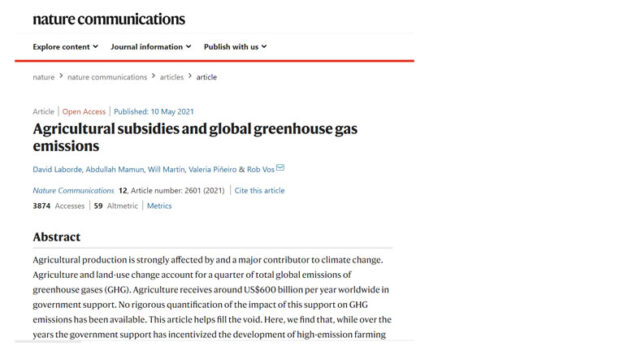We are pleased to announce a new noteworthy publication that was published last May in the prestigious research journal Nature.
With the title “Agricultural Subsidies and Global Greenhouse Gas Emissions” the researchers David Laborde, Abdullah Mamun, Will Martin, Valeria Piñeiro and Rob Vos (International Food Policy Research Institute (IFPRI), Washington, D.C., USA); focus on the implications of current agricultural support policies for GHG emissions. To do this, they apply a rigorous model-based analysis of the impacts of incentives on agricultural production and emissions.
According to this publication, greenhouse gas (GHG) emissions from agriculture are strongly concentrated in a few basic products, with beef, dairy and rice accounting for more than 80% of GHG agricultural emissions. However, the production of these emissions-intensive goods tends to receive strong support through market price support measures (which for the period 2017 – 2019 was US$ 446 billion. This suggests a clear link between agricultural support and GHG emissions.
Therefore, and as the paper authors state in the results, it is clear that, if we replace productions with higher emission intensities with productions with lower emissions, global GHG emissions will decrease.
Likewise, the impact of the current agricultural support measures on GHG emissions was estimated through simulations, where the observed levels of production and emissions by country and commodity are compared with those that would occur without government support.
However, we are not going to offer you the results, as we encourage you to consult them directly from the publication.
